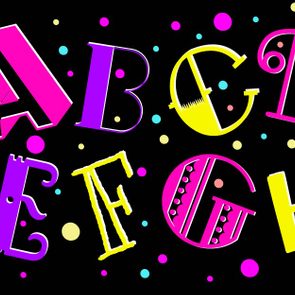The English language is filled with silent letters. But there is one letter that always shows up loud and clear. Can you guess which?

Here’s Which Letter Is Never Silent in the English Language

Consider these five words: honest, grudge, pneumonia, wrestle and aisle. At first glance, you probably won’t think they have anything in common, aside from the fact that they all contain the most common letter in the English language. (It’s e. You’re welcome!) But a closer look—or a slower enunciation—might clue you in on another common feature: They all have silent letters. While the dictionaries are filled with many more, it’s tougher to pinpoint which letter is never silent in the English language. And yes, there is one!
How we pronounce a word today often depends on where it came from, so knowing its origin can help explain those pesky silent letters. Just look at the word knight. It comes from the German word knecht, which means “servant.” In English, the k is silent, but all the syllables are pronounced in German.
And yet, despite the many foreign languages that have overlapped in order to give us the full English vocabulary, there’s a letter that is never silent in the English language. Read on to find out which one it is.
Get Reader’s Digest’s Read Up newsletter for more knowledge, tech, travel, cleaning, humor and fun facts all week long.
What are silent letters?
English is nothing if not complex, so here’s a quick refresher on silent letters. According to Grammarly, silent letters are “letters that are used in the official spelling of a word but are not pronounced.” Sometimes, these silent letters also pair with other letters to come up with a brand new sound, different from the letter’s traditional sound. For example: gh in the word laugh, which produces an f sound.
Many silent letters also follow a pattern, such as k before n in words like knowledge and knee, and g before n in words like gnocchi and gnarly. However, there are always exceptions. The letters k and n are both pronounced in nickname, and the word magnet elicits the sound for both g and n despite appearing one after the other.
But the oddest exception to typical silent-letter rules isn’t those sometimes-pronounced sounds—it’s the one letter that is never silent. Ever.
Which letter is never silent in the English language?
The one letter that is never silent in English is v. Whether it’s making an appearance in fancy words like quiver, reverie and vivid or showing up in old standbys like very and view, you can rest assured it always makes a sound.
And that’s uncommon! Even lesser-used letters like z and j are silent in words that we have adopted from foreign languages, such as marijuana (originally a Spanish word) and laissez-faire (from French).
It’s no secret that language has heaps of confusing grammar rules, and the way we pronounce words is no exception. But here’s one you can bet on: While all other letters may take some planned time off from their acoustic duties once in a while, the letter v always shows up—loud and clear.
Why trust us
At Reader’s Digest, we’re committed to producing high-quality content by writers with expertise and experience in their field in consultation with relevant, qualified experts. We rely on reputable primary sources, including government and professional organizations and academic institutions as well as our writers’ personal experiences where appropriate. For this piece on which letter is never silent in the english language, we verified all facts and data and backed them with credible sourcing, and we’ll revisit them over time to ensure they remain accurate and up to date. Read more about our team, our contributors and our editorial policies.
Sources:
- The Independent: “Why do we have silent letters in the English language?”
- Grammarly: “Silent Letters in English: A Guide With Examples”
- Merriam-Webster: “Every Letter Is Silent, Sometimes”























